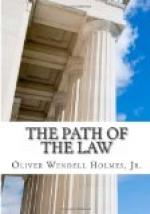The number of our predictions when generalized and reduced to a system is not unmanageably large. They present themselves as a finite body of dogma which may be mastered within a reasonable time. It is a great mistake to be frightened by the ever-increasing number of reports. The reports of a given jurisdiction in the course of a generation take up pretty much the whole body of the law, and restate it from the present point of view. We could reconstruct the corpus from them if all that went before were burned. The use of the earlier reports is mainly historical, a use about which I shall have something to say before I have finished.
I wish, if I can, to lay down some first principles for the study of this body of dogma or systematized prediction which we call the law, for men who want to use it as the instrument of their business to enable them to prophesy in their turn, and, as bearing upon the study, I wish to point out an ideal which as yet our law has not attained.
The first thing for a businesslike understanding of the matter is to understand its limits, and therefore I think it desirable at once to point out and dispel a confusion between morality and law, which sometimes rises to the height of conscious theory, and more often and indeed constantly is making trouble in detail without reaching the point of consciousness. You can see very plainly that a bad man has as much reason as a good one for wishing to avoid an encounter with the public force, and therefore you can see the practical importance of the distinction between morality and law. A man who cares nothing for an ethical rule which is believed and practised by his neighbors is likely nevertheless to care a good deal to avoid being made to pay money, and will want to keep out of jail if he can.
I take it for granted that no hearer of mine will misinterpret what I have to say as the language of cynicism. The law is the witness and external deposit of our moral life. Its history is the history of the moral development of the race. The practice of it, in spite of popular jests, tends to make good citizens and good men. When I emphasize the difference between law and morals I do so with reference to a single end, that of learning and understanding the law. For that purpose you must definitely master its specific marks, and it is for that that I ask you for the moment to imagine yourselves indifferent to other and greater things.
I do not say that there is not a wider point of view from which the distinction between law and morals becomes of secondary or no importance, as all mathematical distinctions vanish in presence of the infinite. But I do say that that distinction is of the first importance for the object which we are here to consider—a right study and mastery of the law as a business with well understood limits, a body of dogma enclosed within definite lines. I have just shown the practical reason for saying so. If you want to know the




